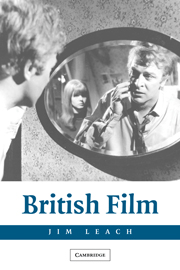Book contents
- Frontmatter
- Contents
- Acknowledgments
- Introduction
- 1 The National Health: Great Britain/Deep England
- 2 The Magic Box: What Is British Cinema?
- 3 The Common Touch: The Art of Being Realistic
- 4 The Mirror Crack'd: British Expressionism
- 5 Millions like Us: National Cinema as Popular Cinema
- 6 The Stars Look Down: Acting British
- 7 No Sex Please – We're British: Sex, Gender, and the National Character
- 8 Carry On Regardless: The British Sense of Humor
- 9 Sexy Beasts: British Monsters
- 10 The Ruling Class: Ideology and the School Movie
- 11 The Long Memory: History and Heritage
- 12 I'm British but … : Empire and After
- Notes
- Bibliography
- Filmography
- Index
12 - I'm British but … : Empire and After
Published online by Cambridge University Press: 07 May 2010
- Frontmatter
- Contents
- Acknowledgments
- Introduction
- 1 The National Health: Great Britain/Deep England
- 2 The Magic Box: What Is British Cinema?
- 3 The Common Touch: The Art of Being Realistic
- 4 The Mirror Crack'd: British Expressionism
- 5 Millions like Us: National Cinema as Popular Cinema
- 6 The Stars Look Down: Acting British
- 7 No Sex Please – We're British: Sex, Gender, and the National Character
- 8 Carry On Regardless: The British Sense of Humor
- 9 Sexy Beasts: British Monsters
- 10 The Ruling Class: Ideology and the School Movie
- 11 The Long Memory: History and Heritage
- 12 I'm British but … : Empire and After
- Notes
- Bibliography
- Filmography
- Index
Summary
The empire film constitutes one of the most distinctive British genres. Stories of British colonial endeavors were, however, themselves colonized by Hollywood in the 1930s in films like The Charge of the Light Brigade (Michael Curtiz, 1936) and Gunga Din (George Stevens, 1939), which exploited the opportunities for action and spectacle in exotic imperial settings (India in both these cases) and drew on the acting talents of Hollywood's British colony. Alexander Korda struck back with a series of lavish empire films, whose extensive location shooting was made possible by the cooperation of imperial authorities. The most successful of these were directed by his brother Zoltan, including Sanders of the River (1935), about the civilizing influence of a colonial administrator in Africa, and a trilogy of films set in India: Elephant Boy (1937, codirected by Robert Flaherty), The Drum (1938), and The Four Feathers (1939)
The last two films were filmed in Technicolor to make the most of the exotic settings, while their stories of bravery and sacrifice stressed the scope and beneficence of British imperial rule. It was already becoming clear that the empire's days were numbered and, after World War II, the dismantling of the British Empire – as former colonies became independent states – was one of the most visible signs that the nation was no longer a major world power. In the 1960s Hollywood studios invested in several British-made “postimperial” epics, including Lawrence of Arabia (David Lean, 1962), Zulu (Cy Endfield, 1963), and Khartoum (Basil Dearden, 1966), set in the past but expressing “a sense of the impending end of Empire or a more complex and ambivalent attitude towards it” (Figure 74).
- Type
- Chapter
- Information
- British Film , pp. 219 - 234Publisher: Cambridge University PressPrint publication year: 2004



